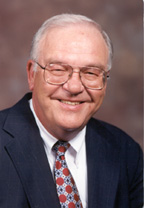 University of Nebraska President L. Dennis Smith Monday announced that he will step down effective June 30, 2004. He has served as president of the four-campus University of Nebraska system since March 1, 1994.
University of Nebraska President L. Dennis Smith Monday announced that he will step down effective June 30, 2004. He has served as president of the four-campus University of Nebraska system since March 1, 1994.
Smith will take professional development leave to prepare for his return to the classroom in the fall of 2005. He will teach in the School of Biological Sciences at the University of Nebraska-Lincoln.
“I believe I am leaving a university that is better today than it was a decade ago,” Smith said. “We have weathered many storms. But I am proud of the accomplishments of the past decade – the university is solidly on the right course.”
Smith said that his number one goal throughout his tenure has been quality, and the quest to make the University of Nebraska one of the best public universities in the country. He detailed several accomplishments that have helped move NU toward that goal.
“First,” he said, “we have the right people in place.” Smith hired all of the current chancellors and four of the five vice-presidents. “We have a team of chancellors and vice presidents who have dedicated themselves to hiring outstanding faculty and running the university efficiently. This is an extremely well managed university with some of the best faculty and staff in the United States.”
The second area he cited is the growth of resources needed to build the academic reputation of the university. The success of the University of Nebraska Foundation’s $727 million Campaign Nebraska and a steady increase in federal grants and contracts – now nearly $150 million annually – are two examples.
During Smith’s tenure, more than 5 million square feet of facilities have been renovated and constructed, including residence halls, classrooms and research laboratories. Among the new facilities constructed are the Lied Transplant Center at UNMC, Othmer Hall at UNL, the College of Education building at UNK, and the Peter Kiewit Institute and its adjacent South Campus facilities at UNO.
Finally, Smith cited unique partnerships that have been created among campuses, and between the university and the business community. The result has been collaborations such as the Rural Initiative, the Peter Kiewit Institute, the Nebraska Medical Center and the Center for Biosecurity. “These partnerships are especially important in a state with limited financial resources,” Smith said.
In accepting Smith’s decision to step down, Randy Ferlic, Chairman of the Board of Regents said, “Dennis Smith has refocused the University of Nebraska and made it a stronger academic institution. His emphasis on quality, his passion for research, his relationships with the business community, and his demand for more efficiency have served the university and the state of Nebraska exceptionally well.”
Ferlic said a national search will be launched this fall to replace Smith.
Even as he announced his departure, Smith noted that he “will not be idle” during the next 10 months. He identified five objectives for the year, which will be elaborated in his State of the University address on October 17.
Those include:
- Completion of a $20 million fund-raising campaign to provide scholarships and other aid for students who would otherwise not be able to attend the university.
- Technological improvements to lay the foundation for a wireless university with an integrated student information system, and to complete a statewide telecommunications network connecting educational and governmental facilities.
- Stepped up efforts to recruit both in-state and out-of-state students.
- A goal of $175 million in outside research grants – an increase of 20 percent over this fiscal year.
- And finally, a vigorous ongoing effort to promote the university and improve its national academic reputation.
Smith’s announcement came on his wife Suzanne’s birthday.